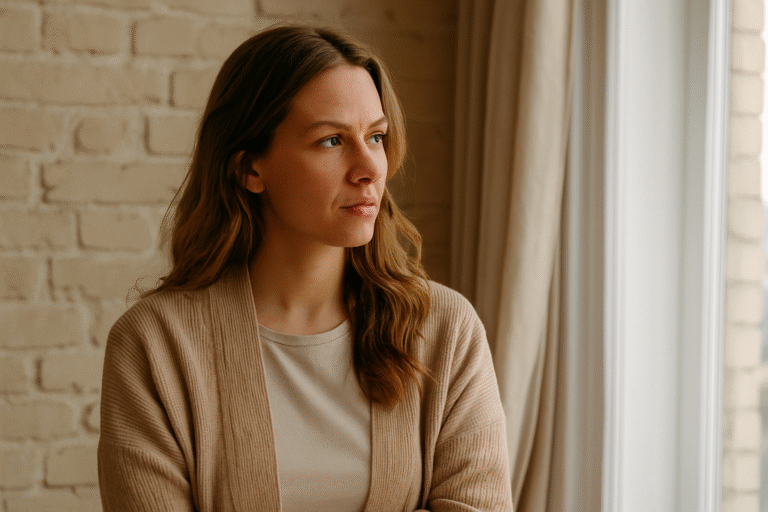Last Updated on July 7, 2025
What if emotional maturity doesn’t eliminate the desire to be received — it simply reveals how long you’ve lived without it?
You’ve cultivated stillness. You’ve learned to pause before reacting, to carry emotion without collapse, and to sort through pain with patience rather than panic. This is real growth. And it matters. But sometimes, in the quiet spaces where no effort is needed and no roles are required, something else rises.
It doesn’t shout. It doesn’t even speak. But it sits there — insistent, unresolved.
It is not weakness. It is not regression. It is the quiet return of something you learned to live without: the hope of being received. Not applauded. Not interpreted. Not asked to explain. Simply held — without having to earn the moment.
This desire does not dishonor the work you’ve done. It does not unravel your strength or undermine your clarity. But it may point to the moment in your story when you first started managing yourself in place of being known.
Scripture speaks to that beginning.
“You, Lord, are our Father. We are the clay, you are the potter; we are all the work of your hand.” (Isaiah 64:8, NIV)
That voice — the one who shaped you — did not wait for your strength to show. He formed you before you were able to explain anything at all. His hands were not drawn to what you could hold together. They held you before you ever carried yourself.
You were never meant to sculpt yourself into something worthy of love. You were already the work of His hands.
Let that be the beginning again.
The Cost of Self-Sculpting
There is a kind of composure that feels like strength. You learn to name what you feel without unraveling. You respond with thoughtfulness instead of fear. You become the person others trust to stay steady. And while much of this is rooted in truth and maturity, it can quietly harden into something else.
Self-sculpting.
Not the kind that refines, but the kind that hides.
It’s subtle. At first, you’re managing your inner world for the sake of healing. But over time, composure becomes protection. Stillness becomes silence. You are no longer just honoring your growth — you are using it to avoid the ache of needing what never came.
You stop reaching for things you’ve decided you no longer need. Emotional nearness. Gentle pursuit. The experience of being known without having to make sense of it. You tell yourself you’re fine — not because you are unshaken, but because there’s no space to be anything else.
And from the outside, it looks like strength.
You are trusted. Admired. Composed.
But inwardly, it costs something. You begin to wonder: Has my self-control made me invisible? Have I managed myself out of the possibility of being seen?
The voice that shaped you never asked you to disappear beneath your own refinement. It never asked for perfection. It never required that you earn nearness through order. That voice — the one Isaiah calls the voice of a Father — formed you as clay, not stone.
You were never asked to finish what He began.
The Silence That Doesn’t Settle
Over time, stillness becomes your strength. You know how to hold space without rushing to fix. You’ve learned to make peace with unanswered questions. You begin to associate silence with spiritual maturity — and often, it is. But there is another kind of silence that doesn’t settle. A silence that doesn’t open. A silence that doesn’t bring rest, but slowly erodes your sense of being known.
This kind of silence does not arrive in crisis. It creeps in quietly, almost reverently, under the cover of wisdom. You pray, but without much expectation. You journal, but your words circle the same conclusions. You name your emotions, but rarely speak them aloud to anyone who might meet them with presence.
You no longer feel unraveled. But you do feel alone.
You wonder — not in bitterness, but with a kind of tired grace — if anyone sees what has gone quiet in you. If anyone notices the longing behind your strength. If anyone will ask about the part of you that has stopped asking for anything at all.
The question becomes less about faith and more about nearness.
If I stopped managing myself so carefully, would anyone come close?
It is here that the tension returns. You don’t want to abandon the strength you’ve built. But you also don’t want to be contained by it. You want to be seen without first having to soften, explain, or convince. You want to be received — not interpreted.
That longing doesn’t make you fragile. It makes you honest.
And perhaps, in that honesty, the silence can become something else. Not the end of presence, but the place where invitation begins again.
The Father Who Saw First
Before any strength. Before any prayer. Before the words to explain what you felt or the courage to feel it at all — there was a voice that saw you.
Isaiah doesn’t begin with what we’ve built. He begins with what we were.
“You, Lord, are our Father. We are the clay, you are the potter; we are all the work of your hand.” (Isaiah 64:8, NIV)
This is not the language of accomplishment. It is the language of being formed. The shaping does not come in response to performance. It comes from love that precedes motion.
You were not sculpted into being by your own discipline. You were not gathered together by your insight. You were held and shaped and seen before you ever learned how to explain yourself.
That is the voice you long to hear again.
It is not the voice of judgment or correction. It is not the voice that asks you to return to composure. It is the voice that called you good before you stood tall, before you knew how to carry anything, before you called that ache by name.
It is the voice that called Jesus “Beloved” before He healed, before He preached, before He resisted the wilderness.
“You are my Son, whom I love; with you I am well pleased.” (Mark 1:11, NIV)
That was not said in response to strength. It was said at the beginning.
And it is still being said.
You are not invited to sculpt yourself into someone who is easier to love. You are invited to return to the One who saw you first — and loved you in the unshaped, wordless silence of who you already were.
Let That Be the Beginning Again
You do not need to become smaller to be seen.
You do not need to unravel in order to be received.
And you do not need to question the depth of your growth simply because the desire to be held has returned.
Longing is not failure. It is memory.
It remembers the voice that called you good before you spoke a word. It remembers the hands that formed you before you gathered yourself into strength. It remembers that you were never meant to live untouched by tenderness, or unreceived in the very shape of your being.
There is no shame in wanting that voice again.
And if emotional maturity has taught you anything, perhaps it is this: that the desire to be received is not something you grow out of — it is something you grow into, more honestly.
You were shaped by hands that saw before they sculpted. You are still being held by the One who names before He sends. Let that be enough — not as an end, but as a beginning.
Where have you mistaken quiet composure for the absence of desire?
Closing Prayer
Father, receive me again where I’ve grown silent.
Remind me that I was shaped by Your hands, not by my own effort.
Teach me to rest in being seen before I speak,
And help me remember that I was always Yours.
Amen.

The Better Portion
Trade your distraction for devotion and your busyness for belonging, through scripture-centered reflections and questions.



